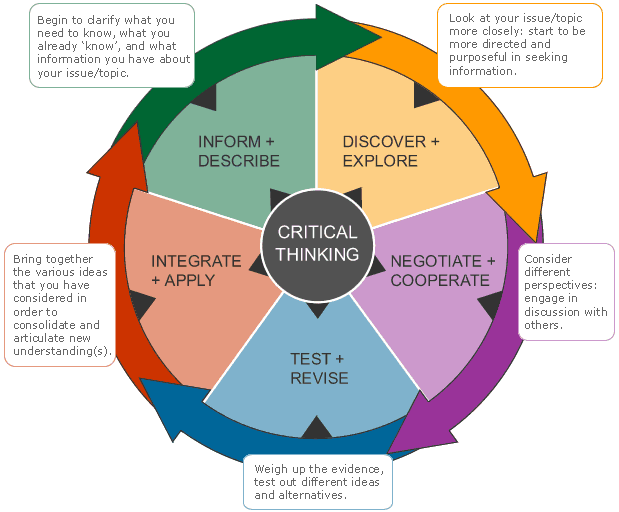In my last post, I explained why I don't think anyone can claim to have absolute knowledge and why I think science represents the most accurate and reliable view of reality. In this post, I examine how the belief in absolute human knowledge can impair critical thinking.
The Importance of Doubt
As I explained in my last post, I don't think anyone can claim to have absolute knowledge; our biological limitations, previous experiences, and biases distort our perception of reality. But we have to develop a way of thinking to understand the world, and those ways of thinking become our beliefs. For example, I base my understanding of the world on scientific ideology because, as I also explained in my last post, science represents the most accurate and reliable way of understanding reality that we know of. And science bases its reasoning on critical thinking and empirical evidence.
Critical thinking requires doubt about the accuracy of our perception of reality, even doubt about science. Economist Deirdre McCloskey expresses this relativistic worldview when she reminds us that “scientists are human speakers,” and even Nobel prize-winning physicist Niels Bohr once said that physics is not about reality itself but “what we humans can say about the physical world” (qtd. in McCloskey 186). If we doubt the accuracy of our perception of reality and become willing to evaluate our beliefs, we can recognize how they influence the way we understand--and interact with--the world.
But the belief in absolute human knowledge discourages critical thinking because it discourages doubt. People who believe they have absolute knowledge subsequently believe in the accuracy and infallibility of their perception of reality. A prime example of this is the scene in Bill Maher's Religulous in which the truck driver states, "I know there's a god. You can't change my mind. Nobody can change my mind." People who believe they have absolute, perfect knowledge have no incentive to question their beliefs, and this disincentive impairs critical thinking.
I can see why many people resist critical thinking. First, it is mentally draining. Listening to and evaluating arguments, putting aside biases, tolerating the discomfort of uncertainty, and changing beliefs requires “considerable mental activity” (Browne and Freeman 308, Mason 346). Second, critical thinking threatens to destabilize our sense of identity: People shape their identity around their beliefs, so threats to the stability of their perceived reality also threatens their identity (qtd. in Gorzelsky 74-5). So, people often resist questioning their beliefs to protect themselves from losing control of their existing psychological structures. Self-analysis takes courage.
The Influence of Absolutism on Moral Development and Ethical Behavior
Why should we care if people refuse to question their beliefs? Because people act upon their beliefs, and doing so ultimately influences the rest of society. People who reject critical thinking prevent themselves from evaluating their beliefs, protecting themselves from manipulation, recognizing their own potential for change, and understanding alternative beliefs. For example, a lack of understanding about alternative beliefs affects society when the individual votes on public policies.
Critical thinking, on the other hand, encourages behavior that generally benefits society:
- It allows individuals to protect themselves from coercion by learning how to identify false or deceptive claims within their belief structures (Browne and Freeman 307).
- It encourages individuals to consider alternative beliefs and the contexts (cultural, political, religious) in which those beliefs are embedded—what Janette Ryan and Kam Louie call a “meta-cultural awareness” (Mason 345). This awareness encourages tolerance instead of “egocentric and sociocentric thinking” (Mason 341).
- It shows that people can change their beliefs and behavior, despite the fatalistic assumption that people exist in a “static state of being” rather than a “dynamic state of change,” an assumption that “denies and undermines a person’s potential for change and insists that a person forever remain handicapped by past views and actions” (Parker 85). This abillity to change encourages compassion instead of resentment.
Critical thinking benefits society, but it depends on doubt. If we protect others from the discomfort of doubt (e.g., by avoiding disagreements), we ultimately do them--and ourselves--a disservice.
Work Cited
Browne, M. Neil, and Kari Freeman. “Distinguishing Features of Critical Thinking Classrooms.” Teaching in Higher Education 5.3 (2000): 301-309. Web.
Gorzelsky, Gwen. “Working Boundaries: From Student Resistance to Student Agency.” College Composition and Communication 61.1 (2009): 64-84. Web.
Mason, Mark. “Critical Thinking and Learning.” Educational Philosophy and Theory 39.4 (2007): 339-349. Web.
McCloskey, Deirdre Nansen. “The Rhetoric of the Economy and the Polity.” Annual Review of Political Science 14.1 (2011): 181-199. Web.
Parker, Douglas H. “Rhetoric, Ethics and Manipulation.” Philosophy and Rhetoric 5.2 (1972): 69-87. Web.




